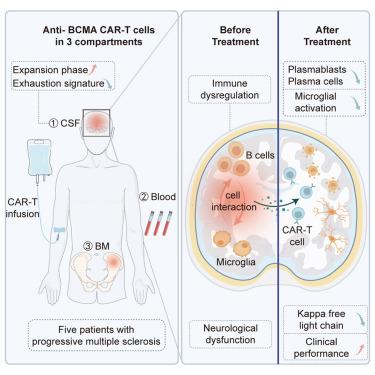Anti-BCMA CAR-T therapy in patients with progressive multiple sclerosis
IF 42.5
1区 生物学
Q1 BIOCHEMISTRY & MOLECULAR BIOLOGY
引用次数: 0
Abstract
Progressive multiple sclerosis (PMS), which is characterized by relentless disease progression, lacks effective treatment. While recent studies have highlighted the importance of B cells in driving compartmentalized central nervous system (CNS) inflammation in PMS pathogenesis, current B cell depletion therapies, such as CD20 monoclonal antibodies, face challenges in targeting plasma cells within the CNS. Here, we treated five patients with PMS (one primary PMS and four secondary PMS) with anti-B cell maturation antigen (BCMA) chimeric antigen receptor T (CAR-T) cell therapy in an ongoing phase 1 clinical trial (ClinicalTrials.gov: NCT04561557). Only grade 1 cytokine release syndrome was observed, and all grade ≥3 cytopenias occurred within 40 days post-infusion in all five patients. Meanwhile, we detected plasma cell depletion in CNS compartments, prolonged expansion and relieved exhaustion of CAR-T cells in the cerebrospinal fluid, and attenuation of microglial activation. These findings provided insights into the potential application of anti-BCMA CAR-T therapy for advancing clinical management of PMS.

抗bcma CAR-T治疗进展性多发性硬化症
进行性多发性硬化症(PMS)的特点是疾病持续进展,缺乏有效的治疗。虽然最近的研究强调了B细胞在PMS发病机制中驱动区隔中枢神经系统(CNS)炎症的重要性,但目前的B细胞消耗疗法,如CD20单克隆抗体,在靶向CNS内的浆细胞方面面临挑战。在这里,我们用抗b细胞成熟抗原(BCMA)嵌合抗原受体T (CAR-T)细胞疗法治疗5例PMS患者(1例原发性PMS和4例继发性PMS),该疗法正在进行1期临床试验(ClinicalTrials.gov: NCT04561557)。仅观察到1级细胞因子释放综合征,所有5例患者均在输注后40天内出现≥3级细胞减少。同时,我们检测到CNS室浆细胞耗竭,脑脊液中CAR-T细胞延长扩增和缓解耗竭,以及小胶质细胞活化减弱。这些发现为抗bcma CAR-T疗法在推进经前症候群临床管理方面的潜在应用提供了见解。
本文章由计算机程序翻译,如有差异,请以英文原文为准。
求助全文
约1分钟内获得全文
求助全文
来源期刊

Cell
生物-生化与分子生物学
CiteScore
110.00
自引率
0.80%
发文量
396
审稿时长
2 months
期刊介绍:
Cells is an international, peer-reviewed, open access journal that focuses on cell biology, molecular biology, and biophysics. It is affiliated with several societies, including the Spanish Society for Biochemistry and Molecular Biology (SEBBM), Nordic Autophagy Society (NAS), Spanish Society of Hematology and Hemotherapy (SEHH), and Society for Regenerative Medicine (Russian Federation) (RPO).
The journal publishes research findings of significant importance in various areas of experimental biology, such as cell biology, molecular biology, neuroscience, immunology, virology, microbiology, cancer, human genetics, systems biology, signaling, and disease mechanisms and therapeutics. The primary criterion for considering papers is whether the results contribute to significant conceptual advances or raise thought-provoking questions and hypotheses related to interesting and important biological inquiries.
In addition to primary research articles presented in four formats, Cells also features review and opinion articles in its "leading edge" section, discussing recent research advancements and topics of interest to its wide readership.
 求助内容:
求助内容: 应助结果提醒方式:
应助结果提醒方式:


